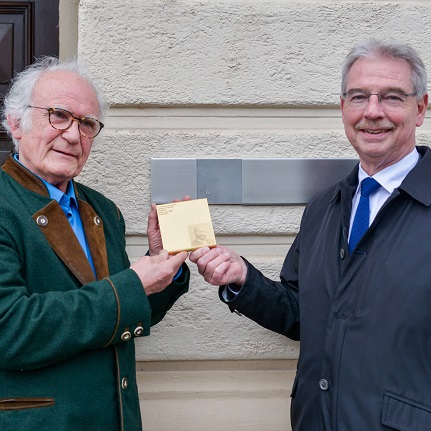Samson Felix Perutz was born on February 27, 1875 in Heufeld near Rosenheim and grew up in Munich. He was the oldest of six sons of the chemist Otto Perutz and his wife Caroline, née Oberndörfer. However, none of his younger brothers survived childhood.
Felix Perutz attended the Wilhelmsgymnasium high school in Munich, where he passed his Abitur (school leaving examination and university entrance qualification) in 1893. He then studied medicine and gained his PhD in Munich in 1897 with a thesis on primary lung carcinoma. He began his professional career in 1899 as a volunteer doctor at the Städtisches Krankenhaus (Municipal Hospital) “Am Urban” in Berlin. From 1900 to 1901 he was an assistant doctor at the Städtisches Krankenhaus (Municipal Hospital) in Worms, before moving to the “Haus Schönow” psychiatric sanatorium in what is now the city district of Berlin-Zehlendorf.
Felix Perutz married Helene Auguste Emilie Schöttle, a protestant from Stuttgart, in Reutlingen on August 2, 1902. He himself converted from the Jewish faith to the Protestant-Lutheran faith. In doing so, he uprooted himself from his Jewish origins, his Jewish family, the Jewish congregation, almost the entire Jewish community. It can be assumed that this immensely rigorous step by a man intent on assimilation was by no means painless.
Felix and Helene Perutz had two daughters and a son. The young family lived at first at Schellingstrasse 2 in Munich. Felix Perutz had his practice for gastrointestinal diseases there too. In 1916 the family moved to Kaulbachstrasse 8; the practice moved to Sonnenstrasse 12. In 1923 Felix Perutz was given the honorary title of “Sanitätsrat” (“Medical Councillor”).
Felix Perutz was involved in the First World War as a militia doctor and was stationed among other places in France. For his service he was awarded the Iron Cross 2nd Class in 1915 and in 1916 the Royal Distinguished Military Service Medal of the Kingdom of Bavaria with Swords.
Felix Perutz was socially active in many ways, treating poor families free of charge and, from 1924 to 1931, looking after the children in the Evangelical Orphanage in Kaulbachstrasse as their family doctor. Felix Perutz was also one of the founding members of the Bavarian State Association Against Alcoholism and was its chairman from 1921 to 1924. Having been the chairman before the First World War of the Contracts Committee of the Munich Medical Association for Free Choice of Doctor, he was its list checker from 1924 to 1933. He was also for many years an assessor and secretary in the Medical District Association of Munich City.(Text: Benno Freiherr von Rechenberg: editor C Fritsche; translation C. Hales)





